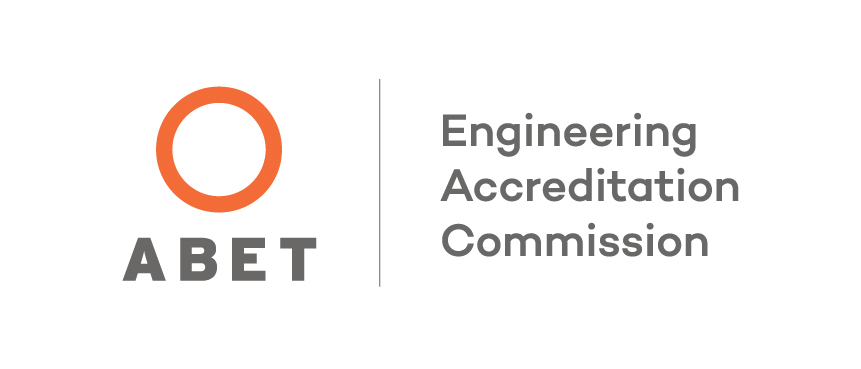Support Page Content
Accreditation & Assessment
Mission
The mission of the Bachelor Science degree program in Computer Engineering (BSCpE) at CSUS is to provide an outstanding, hands-on education in Computer Engineering.
Goal
The goal of the program is to provide students with a high-quality education that will transform them into professional engineers who are prepared to meet the needs of society and adapt to rapidly changing technology.

The BS degree in Computer Engineering is accredited by the Engineering Accreditation Commission (EAC) of ABET, http://www.abet.org
The program educational objectives are also consistent with ABET educational criteria. The objectives provide for educating students to be able to conduct computer engineering work in a professionally responsible and ethical manner and to be able to communicate the results of their work to all stakeholders.
CpE Program Educational Objectives
The Computer Engineering Program’s specific educational objectives are to educate graduates that possess:
- Core Knowledge: Our graduates will have careers in computer engineering, or be engaged in a related career path.
- Application of Knowledge: Our graduates will apply their knowledge and skills to solve practical engineering problems.
- Lifelong Learning: Our graduates will continue to develop their skills and seek knowledge after graduation in order to adapt to advancing technology and the needs of society. This may be indicated by the graduate’s pursuit of an advanced degree or other formal instruction, and/or that the graduate has developed a professional specialty.
- Professionalism: Our graduates will have the necessary professional skills, such as high ethical standards, effective oral and written communications, and teamwork, to be productive engineers and to advance in their careers.
The objectives describe the features that are considered important in an outstanding hands-on education in Computer Engineering.
The program educational objectives are consistent with the University Mission, which can be summarized in the following two quotes from the University Policy Manual: "The University’s mission is guided by fundamental values which reflect its identity as a public, regional, comprehensive, metropolitan university.
Thus, California State University, Sacramento seeks to offer individuals the opportunity to realize their highest aspirations and become active and involved citizens for the good of the individual and society," and "We reaffirm the value of and need for education of the whole person in the tradition of a liberal undergraduate education. Building on the fundamental knowledge and skills acquired through a general education program, the University offers traditional liberal arts disciplines and professional studies which emphasize three critical curricular values - acquisition of knowledge, the development of critical thought processes, and the synthesis of knowledge - hallmarks of an educated person."
By preparing students to succeed in professional employment and/or graduate study in computer engineering, the program offers individuals "the opportunity to realize their highest aspirations." By preparing students to identify, analyze, and solve practical engineering problems, the program emphasizes "the development of a critical thought process" and by preparing students to apply knowledge of logic design, microprocessors, signal processing, computer architecture, networking, programming languages, operating systems, data structure, and data communication to the design of computer engineering projects, the program emphasizes "the acquisition and synthesis of knowledge."
Finally, by preparing students to communicate effectively with their peers, other professionals, decision makers, and the general public in the conduct of their work, and to practice electrical engineering in a professionally responsible and ethical manner, the program enables graduates to "become active and involved citizens for the good of the individual and society."
Student Learning Outcomes
Excerpted from ABET General Criterion 3 for Accreditation of Engineering Programs, applicable beginning in 2019-20 cycle:
- An ability to identify, formulate, and solve complex engineering problems by applying principles of engineering, science, and mathematics.
- An ability to apply engineering design to produce solutions that meet specified needs with consideration of public health, safety, and welfare, as well as global, cultural, social, environmental, and economic factors.
- An ability to communicate effectively with a range of audiences.
- An ability to recognize ethical and professional responsibilities in engineering situations and make informed judgments, which must consider the impact of engineering solutions in global, economic, environmental, and societal contexts.
- An ability to function effectively on a team whose members together provide leadership, create a collaborative and inclusive environment, establish goals, plan tasks, and meet objectives.
- An ability to develop and conduct appropriate experimentation, analyze and interpret data, and use engineering judgment to draw conclusions.
- An ability to acquire and apply new knowledge as needed, using appropriate learning strategies.
CpE Assessment Plan
Enrollment & Graduation Data
The tables below shows the most recent enrollment and graduation data compiled by the Office of Institutional Research (OIR).
Enrollment
| Enrollment Fall Semester | 2015 | 2016 | 2017 | 2018 | 2019 | 2020 |
|---|---|---|---|---|---|---|
| Undergraduate Students | 394 | 415 | 440 | 452 | 417 | 424 |
| Graduate Students | 35 | 19 | 12 | 14 | 18 | 17 |
| Department Total | 429 | 434 | 452 | 466 | 435 | 441 |
Degrees Conferred
| Graduation Year | ’15-16 | ’16-17 | ’17-18 | ’18-19 | ’19-20 | ’20-21 |
|---|---|---|---|---|---|---|
| Bachelor’s | 34 | 52 | 39 | 41 | 63 | |
| Master’s | 15 | 1 | 4 | 7 | 7 | |
| Department Total | 49 | 53 | 43 | 48 | 70 |